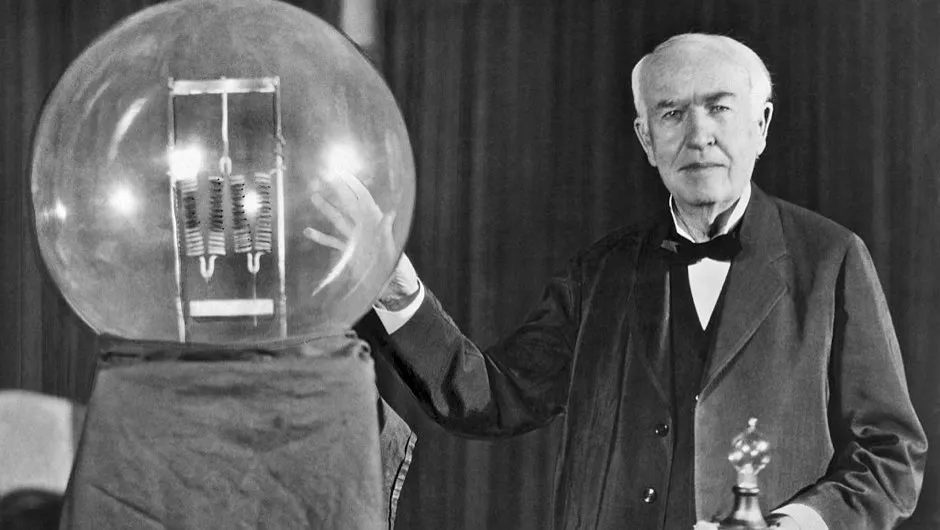Thomas Edison is celebrated as one of the greatest inventors in history. His most renowned invention, the electric light bulb, revolutionized the way humanity lived and worked. The creation of the light bulb brought light to homes and workplaces, shaping the modern world in profound ways.

Thomas Edison: A Visionary Inventor
Early Life and Background
Thomas Alva Edison was born on February 11, 1847, in Milan, Ohio, USA. From an early age, Edison demonstrated an insatiable curiosity and a natural talent for problem-solving. Despite limited formal education, he nurtured his passion for science and technology, teaching himself through voracious reading and experimentation. His innovative spirit eventually led to the creation of over 1,000 patents, earning him a prominent place in the annals of history.
Other Contributions to Technology
While Edison is best known for the light bulb, his contributions extend far beyond this single invention. He developed the phonograph, a groundbreaking device that could record and play back sound, as well as early motion picture cameras, which laid the foundation for the film industry. Edison’s inventions transformed communication, entertainment, and everyday life, cementing his reputation as a pioneer of modern technology.

The Birth of the Electric Light Bulb
The Challenge Before Edison
Before Edison’s breakthrough, various inventors had attempted to create a functional electric light bulb. These early designs were often inefficient, short-lived, or prohibitively expensive, making them impractical for widespread use. The challenge lay in developing a bulb that was both durable and economical, capable of providing consistent illumination for extended periods.
Edison’s Journey to Success
In 1878, Edison embarked on a quest to develop a practical electric light bulb. He assembled a team of skilled researchers at his Menlo Park laboratory, where they experimented tirelessly with various materials and designs. After extensive trials, Edison’s team achieved a breakthrough in 1879. They created a bulb using a carbonized bamboo filament, which proved to be both durable and cost-effective. This innovation allowed the bulb to burn for up to 1,200 hours, a significant improvement over earlier models.
The First Public Demonstration
Edison’s success culminated in a public demonstration of his electric lighting system on December 31, 1879, in Menlo Park. The event marked a turning point in history, showcasing the feasibility of electric light and garnering widespread attention. This demonstration laid the groundwork for the development of an entire industry centered on electric power.

The Impact of the Light Bulb
Transforming Daily Life
Edison’s invention had an immediate and profound impact on society. The electric light bulb replaced traditional sources of light such as oil lamps and candles, offering a safer, cleaner, and more reliable alternative. People could now work, study, and socialize after dark, dramatically extending productive hours and improving quality of life.
Driving Industrialization and Urbanization
The advent of electric lighting played a critical role in the industrial revolution. Factories could operate around the clock, boosting productivity and economic growth. Urban areas, illuminated by electric lights, became safer and more vibrant, attracting businesses and residents alike. This transformation marked the beginning of modern cities as we know them.
Pioneering the Electric Power Industry
To support the widespread adoption of electric lighting, Edison founded the Edison Electric Light Company, which later became part of General Electric. His efforts in developing a complete electrical system—including power generation, distribution, and lighting—laid the foundation for the modern electricity industry. Today, electric power is a fundamental aspect of global infrastructure, underpinning countless technological advancements.

The Legacy of the Light Bulb
Cementing Edison’s Place in History
The invention of the electric light bulb established Edison as a symbol of innovation and perseverance. Known as the „Wizard of Menlo Park,“ he exemplified the power of determination and creativity in overcoming challenges. His achievements continue to inspire inventors and entrepreneurs around the world.
Influencing Science and Technology
Edison’s light bulb not only transformed daily life but also spurred further advancements in science and engineering. The demand for electricity spurred research into energy generation, transmission, and storage, leading to a cascade of technological innovations. The light bulb remains a powerful metaphor for ingenuity and discovery.
Conclusion
Thomas Edison’s invention of the electric light bulb was a pivotal moment in history, illuminating the path to modernity. His unwavering dedication to solving practical problems and his visionary approach to innovation have left an indelible mark on humanity. Edison’s story serves as a reminder of the transformative power of curiosity, perseverance, and a commitment to progress.
